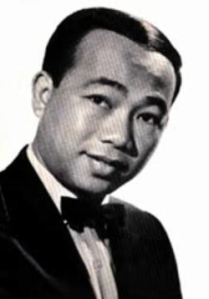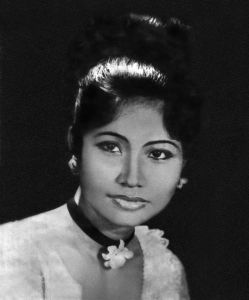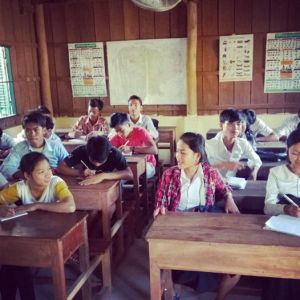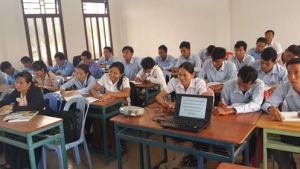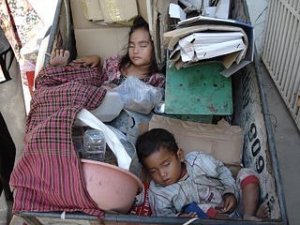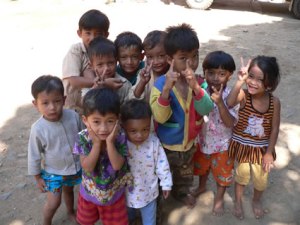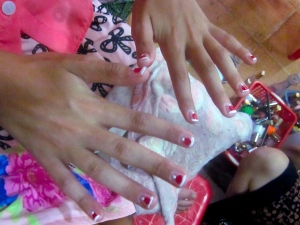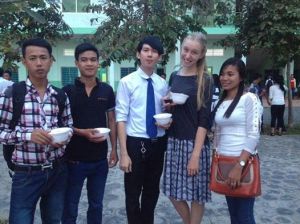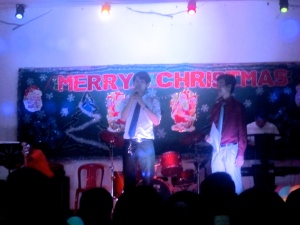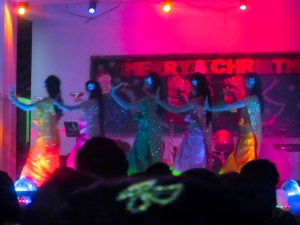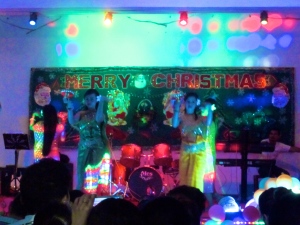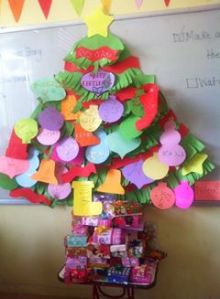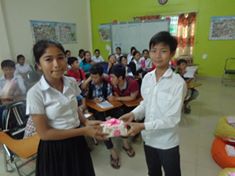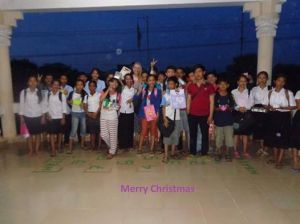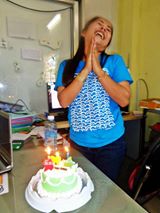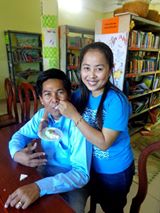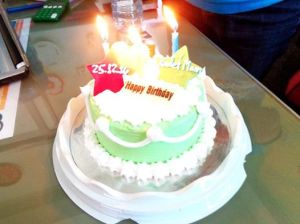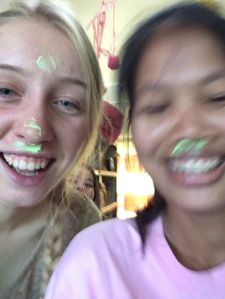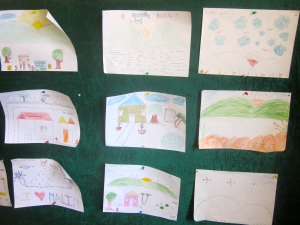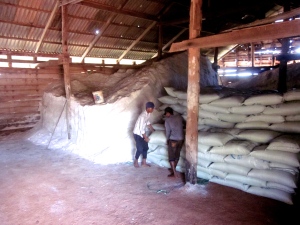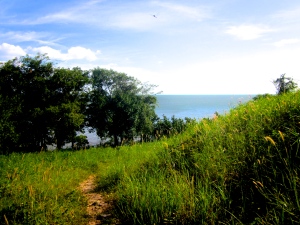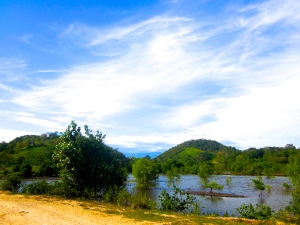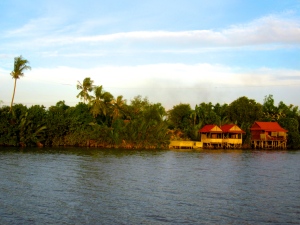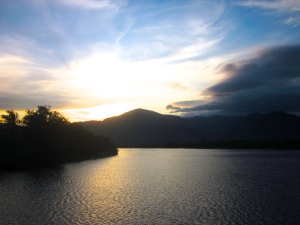Banh Xeo is one of the most traditional Khmer dishes in Southern Cambodia. It is very easy to make as it’s in fact just a crêpe and very, very tasty. You make it out of rice flour and coconut milk. The yellow colour of the crêpe comes through tumeric. In fact it is a much more healthy alternative to the common pancake with sweet milk that most of the restaurants serve for Western tourists. When Sopheak and I decided we wanted to do a cooking workshop, our choice of dish fell on Banh Xeo. It was a crazy act that we went through. The whole classroom was transformed to a cooking studio and around 20 students came to help us. First we chopped vegetable. We needed cucumber, carrots and all sort of herbs. Then we had chilli, peanuts and lime for the sauce in which you dip the Banh Xeo in. Because Sopheak is wonderful and she is the only Khmer person I know that is vegetarian, we made vegetarian Banh Xeo. Normally you put soja bean sprouts and meat inside, when you flap the dough over, but we used beans that tasted a little bit like deliciously fried tofu. We had to use two stoves and everyone took turns with cooking while the rest ate our Banh Xeo experiments that tasted just as good as the ones you can order in the restaurant. Of course they looked a little bit different, but you can find beauty in imperfection. It was a real tohuwabohu, but so much fun I would do it again any time. After we told Sokhan about it he was silent for some seconds, thinking. Then he said: “Well, that is quite a wonderful way to experience your own culture, that is for sure.” After that positive feedback, we were really motivated to do another cooking event soon. But next time it will be quite difficult to top the Banh Xeo.
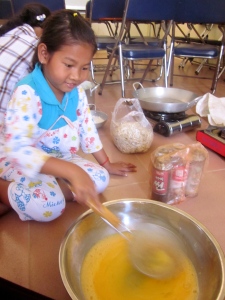
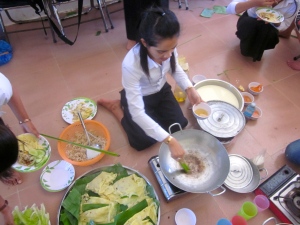
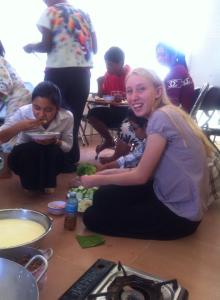
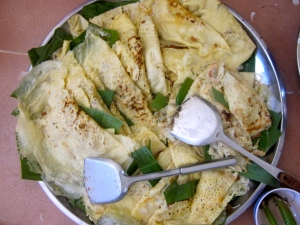
I mentioned this nice Belgian couple that wanted to buy me Hot Belgian Chocolate. They also gave me some stuff for the Learning Center. Pens, paper, glue and all kind of useful things and inter alia a handicraft set. You could make butterfly chains and boxes with motives like flowers and owls with it. All you had to do, is basically sew everything together and stich the pictures on the fabric. Though of course, it’s never that easy in reality. I had maybe a 100 children that wanted to help me and I was occupied with not letting anyone prick a needle in the eye of someone else, while I had the operating instructions in my hand and tried to read them while someone was grabbing my sleeve and screaming, “Cha, Cha, I want the butterfly not the leheheheve!”. I don’t know how I finally managed to finish the whole thing. It took me about three hours and an enormous amount of patience. Another problem was, that stuff just disappeared. When you have a little pearl that you need to sew on a butterfly wing, it is not easy to keep watch on it for that amount of time. In the end it didn’t quite look like on the packing, but it was made with love.
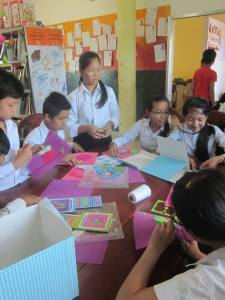
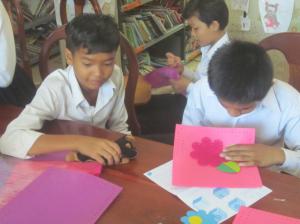
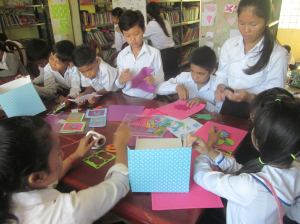
I want to be honest. We have loads of problems in the LC and the root of all of them are children that only ever care about one thing: having fun. They don’t think about being loud, they don’t think about running in full speed, they don’t think about dropping their shoes on the spot, climbing up on places they shouldn’t climb up on, leaving books on the floor and bringing sweets in the library. They are too many and we are outnumbered. It is a war not worth fighting. And still, this week I had a plan, a revolutionary idea, a never before heard of strategy… I pinned a poster with the 15 most important LC rules in the entrance area – with pictures. I know, I know, this might not seem as earthshaking as I would like it to be, but I believe that it’s the little things that can cause a change. Maybe not today and not tomorrow, but possibly on the very day that I am going to leave.
There is this game that I love and could play over and over again, because it promises absolute silence for at least ten minutes. It is called “Dead Fish” and all you really need is huge bunch of pillows. You put them on the floor (we use bean bags) and all the children have to lie down and are not allowed to make a move or any sound at all. Breathing is allowed. One child is the fisherman. He is waiting for a good catch and as soon as he sees one of the fishes twitch, he knows that he can throw out the fishing pole and the child is out of the game. I usually say that the students that wins the game is out of homework duty and this works amazing. Eventually children are children and can’t lie around for ages, not making a move. After all, they are not really dead. So it’s a good game to train concentration, feeling of belonging to a group and a form of meditation, that offers the possiblity to think in the middle of a hectic day.
One of the favourite songs of the children, that I am practising with them on Music Monday (I have one lesson in which we are always singing songs) is “Five Little Monkeys”. It goes like this:
Five little monkeys jumping on the bed
One fell off and bumped his head
Mama called the doctor,
And the doctor said
No more monkeys jumping on the bed
Four little monkeys…
One little boy is so fond of the song, every time I see him he starts singing the song and naturally I join in. Everyone who is not in our Music Monday lesson looks at us as if we are quite weired, but if they knew how addicting the song is, they could understand how we feel.
Talking about activities, a very popular game that gets everyone to laugh and scream like their life depends on it is “Simon Says”. I usually play it after a test as a kind of reward thing. I play the Simon and give the children instructions, for example: “Simon says touch your head.”, then everyone has to touch their head. Or I say “Simon says turn around.”, then everyone has to turn around. The tricky thing is, that I am doing it really fast and they are not allowed to make the move when I don’t say “Simon says” beforehand. You are for example not allowed to sit down when I say “sit down.”, because the ‘Simon says’ is missing. It always takes them two seconds to realize when they made a mistake and then the volume in the class goes so high it is incredible, everyone claiming they didn’t make the false move. When everyone who is out sat down on their chairs, the new round starts and grave silence is lying itself on the classroom. It always works and the children absolutely adore it. There are other games that we play frequently. For example flapchart, hangman or 20 questions. In my opinion these games are a way to grow to love a language and become confident with speaking it.
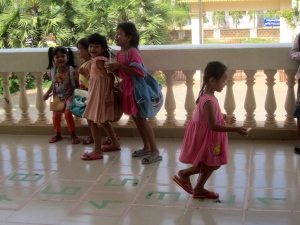
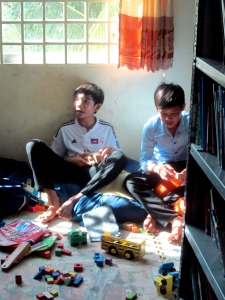
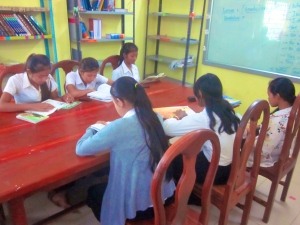
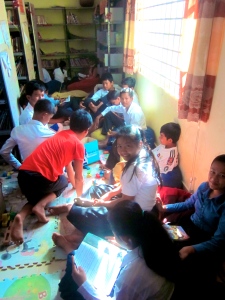
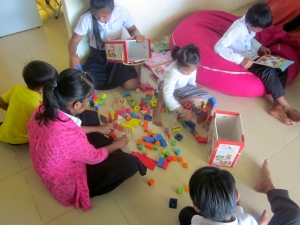
This week was once again a public holiday and I spent it with Sreydieb and Buntha. The night before we had a sleepover at Bunthas house and it was not any different from a normal sleepover, besides some tiny little things. First we had a fondue that we ate on the floor. We sat on a huge bast mat and crowded around the pot to get the best pieces. After that we ate a million jackfruits and made each other braids. Sreydieb looked thoughtful in the mirror for some time, then she decided she wanted a haircut. So Buntha brought a scissor from the kitchen and we cut her hair. Just like that, without any tam tam.
I might have forgotten to talk about my own hair cutting experience at the market. It had cost me 5000 riel and the women was busy for one and a half hours. First she combed my hair (what took her maybe ten minutes, she was very careful with that) and then she cut off five centimeters (what took her a minute). Now the question is what she did in the rest of the time. Well, first she put shampoo on my head. And not just one shampoo, but four different kinds and all that without making my hair wet. There was so much foam on me, I couldn’t see my hair and barely my face anymore. She did this for about 30 minutes and then she washed the foam out. Only to put conditioner on my head though. It was a veeeery long process. And then she began to first massage my head and then my shoulders. I felt like being in a first class celebrity beauty saloon and not in a tiny little hut without air conditioning at the market. When she was finally done with the programm, my hair looked like I was a movie star, beautiful, wavy and shiny. I wish I could get the same thing for just one euro in Germany.
So after we cut Sreydiebs hair, we climbed up the stairs to the second floor, where there is a ladder that leads to the rooftop. Buntha lives in the middle of Angtasom where there are actual houses with several stories and from the top of her house you can see over the whole market to the Learning Center and the main road. We took the mattress from her sleeping room and somehow managed to push it through the opening. I can’t even describe how wonderful this place is. The rooftop is maybe as big as my old room and when you look at the sky, you can see millions of stars and the moon as a round ball, shining brighter than I ever saw him before. We brought every single pillow we could find to the rooftop and build a pillow castle around the mattress. Then we secured a moskito net over the mattress. It was just like sleeping in a four poster bed, that are known from stories like “the Princess and the Pea”. I felt like I never slept at a place so cozy before, everything around me was cuddly and soft and at the same time I felt like I was on top of the world and could touch the stars above me. We watched the Disney Peter Pan movie and talked for a little while afterwards. I just couldn’t fall asleep and while I listened to the sound of Sreydiebs and Bunthas breathing right and left of me, I imagined flying to the sky, taking the second star to the right and fly on straight on ’til morning. It didn’t seem unrealistic to me at that point. And that was what I dreamed of.
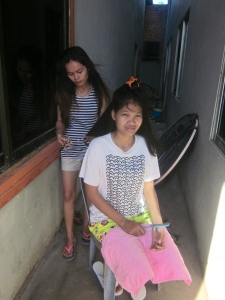
The next morning we planned to visit Sreydiebs mother on the countryside. The problem was that we didn’t get far because Bunthas neighbor knocked at the door and asked us to sell her chickens at the market, because she was busy with some family affair. Great. I always dreamed of selling chicken at a market in Cambodia. The chicken was already cooked by the way. So we walked to the market, chicken under our wing and settled down at the market stall. It was of course just a low wooden table where we sat down next to women selling vegetable and spices. When you buy something at the market in Cambodia, you have to be aware of the fact, that the feet of the women are being comfortably stretched out and touching the products that are being sold. I tried to get away from the chicken and was basically sitting on a bunch of morning glory. Next to me was a hammock with a little baby sleeping in it and the mother was giving it little shoves. It felt claustrophobic. Luckily cooked chicken is very popular and after half an hour we got rid of all the poor individuals that were soon to be part of a family lunch. I asked myself if I maybe should have refused to be part of the chicken seller community or made a sign with some animal right protest quote holding it in customers faces, but I am really just trying to integrate myself. Being a market seller, if only for half an hour, might be a very good step in the right direction.
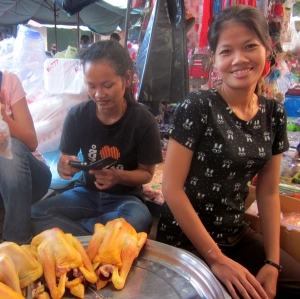
We finally headed of to Sreydiebs birthplace to visit her mum. I will not mention that Sreydieb lost her cap maybe five times along the way and we had to stop to get it back. I knew before that Sreydiebs family was poor. I didn’t know that they were indigently destitute. My host family is maybe one of the wealthiest in Angtasom and surrounding, simply because they deal a lot with foreigners and my host mum has 8 different jobs that I don’t really know how she manages. And of course they live on the countryside and there are many, many poor families that have barely anything, but they still have access to electricity and even wifi. Well, after we left the main road, we drove for maybe an hour along ricefields and ricefields and rice fields that looked all the same. The landscape didn’t change much at all, the only thing that told me we were going farther and farther away from civilization was the fact, that there were less houses and each of them looked more abandoned than the one before. For a long time, we didn’t see anything besides fields and I just couldn’t believe that Sreydieb grew up there. She might have never seen a car in her childhood, never experienced all the thousand of things that we have and never think about. Once I had a conversation about housekeeping technology.
S: Malin, is it true that you have a machines to make the vegetable very small in Germany? So you don’t have to cut it, you just let the machine make it very tiny and it goes really fast?
M: Well, yes. That is called a mixer. You can make tomato sauce with it or a fruit shake…
S: That is amazing! And what about the machine that is cleaning the dishes? Do you have that?
M: Yeah, the dishwasher. Most families have that.
S: But how can it work? When this machines is washing the dishes, how does it know what to wash first and why does it not break anything?
M: It all works with water pressure, I can’t exactly describe how, but it cleans all the dishes at the same time.
S: I wish I had something like that. Can you see how it works?
M: No, usually not. The door is closed. You put the dirty dishes in, wait a little over an hour and then put the clean dishes out.
S: I wish I could see that. And what about a machine that makes the water warm? You sometimes shower with hot water, right?
M: Erm… usually, yes. You can choose if warm or cold water should come out of the faucet.
S: Life must be so easy in Germany, you don’t have to do anything when you come home from work. What other machines do you have?
M: Well we have the washmachine to wash the clothes, we have a vacuum cleaner to soak up the dirt on the floor, we have a machine to dry the hair and a machine to help us brush the teeth…
S: What?! You have a machine to help you brush the teeth? That can’t be true!
M: Oh yes, my dad has one and he always brushes his teeth with it. You can choose what kind of movements the electric toothbrush should make and how fast it should move and stuff like that.
S: Oh I can’t believe it! Poor Cambodia!
I had to think a lot about this conversation and when we stopped in front of Sreydiebs house in the middle of nowhere, I felt like the whole Western world and all the superficial things that make out our daily life, are nothing than a layer that makes us feel better than people that don’t have these material goods, despite the fact that we never did anything to earn them and the only result is that we are getting too spoilt and take everything for granted. Of course, it sometimes sucks to shower with ice cold water, but it makes you feel alive and catapults you out of your comfort zone and into the real life where things can hurt. Sreydiebs house was a shed, comparable to the pictures of Indian slums. It had nothing to do with that idyllic image of a wooden, one story, coloured house in the middle of the ricefields. All I could see was a hammock to sleep in and a pig stall next to the shed that was made of some wooden panels and corrugated iron. Her mom was the most lovely person I ever met. With her are living the four children of Sreydiebs sister that can’t stay with her, as she is working in the factory all day long. Sreydiebs mother hugged me and Buntha a thousand times and when it became apparent that she didn’t have any food that she could offer us (I didn’t really want her to slaughter her pig), she sent the three of us off to go coconut harvesting. We had a very long stick and when I say very long, I mean very long. At the top was a scythe and with that frightening weapon carried under our arms, we set off to the forest. Sreydieb looked judgmental to the palmtreetops and soon found a cocnut that was right. We hovered the scythe up and placed it above the branch on which the coconut was growing on the tree. Buntha was just as lost as I was and it took us ages to finally cut the fruit. With a loud splash it landed on the ground. I always have to think of the statistic that says more people die because they are hit by falling coconuts than shark attacks. When Sopheap had her accident and couldn’t walk anymore, she had to drink a coconut every day. It is so healthy and the really fresh ones taste like they are effervesce. Besides all the benefits for the body the fruit can be used for many more things. People make jewelry, plant pots and coconut oil for hair and skin out of it… The best thing about the big green coconuts is the jelly on the inside of the shell because it tastes just like pudding. I really love coconuts. We harvested around six and took them back to the house where we had a coconut party.
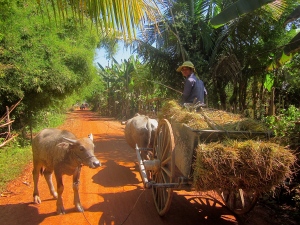
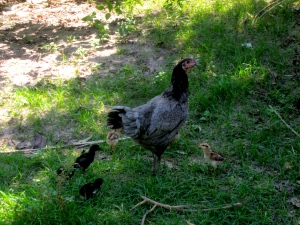
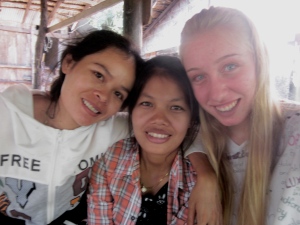
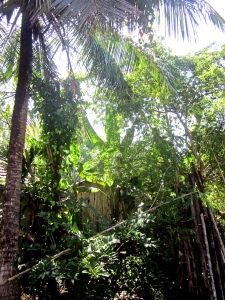
At the time of the French colonalization every child in Cambodia had to learn French in school. The educational system had a very high standard and the culture flourished. This is why many old people can speak French. Even Sreydiebs mother learned some basics in the village school. She wanted to say something to me in French and repeated a sentence many times, but the accents was so strange, I just couldn’t grasp it. Only when she said it in Khmer and repeated it in French, I understood what she meant. “Je t’aime – Knyom srolaing neak – I love you.”, then she smiled happily at me because I finally got it. She really was like an older version of Sreydieb. She hugged me again when we said goodbye and wished me all the best. It is incredible to see how Sreydieb could come from this little village in the middle of nowhere, so far as to work for an international NGO and being about to finish her bachelor in education at university. I might have talked about meeting her sister and the conditions she lives in before, it is just incredible to see the completely different ways in which their lives have developed. Sometimes Sreydieb seems to be so fragile, much alone in the world, with nobody to support her, but in fact she is stronger than most people I know. For example when she takes all the money she can spare and gives it to her mother.
On the way back we stopped at the house of Sreydiebs aunt. She lived closer to Angtasom, about half an hour from her mother. Along the dirtroad, leading from the house of my host family to the main road, everyone is in some way related. Families tend to live close to each other and spend every second of their free time together. This aunt of Sreydieb was a tailor and she was just about to finish a wedding outfit. It was not like the one that I wore, she was busy sewing little glittery pailettes on the fabric in all kind of stunningly beautiful patterns. We just sat there and watched her work for a while. She let flowers and stars emerge just by moving the needle faster than the eye could follow over the silk. When I wanted to know how long it would take her to finish the shirt, Sreydieb said maybe about a week. It was that kind of difficult craft work, that I admire Cambodian women so much for possessing the skill of. They can do everything. And this women didn’t even have a plan, she made up new patterns while working. I had to think how long we were occupied with our sewing set in the Learning Center. Soon the whole family was crowded around us and we talked with everyone, played with the children and finally ate an early dinner there before we returned home.
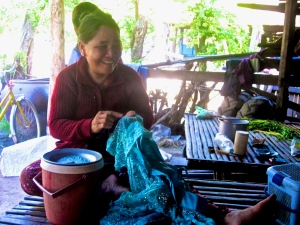
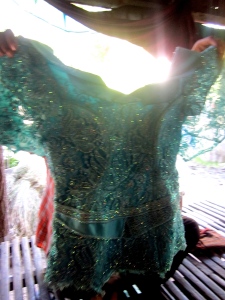
I would like to end this blog article with a story that my hostdad Mach loves to tell. He is quite the joker and if he wants he can get a whole table to laugh. Maybe I mentioned that he, as the born entertainer, climbed the stage on the wedding and performed a few songs. He always tells this story when he is eating guava. He takes some bites before he exclaims: “Oh, very juicy!” and everyone starts laughing. The thing is, that there is always one person that doesn’t get the joke, so Mach starts to prepare for telling the story. It goes like this: a young monk, who is not used to go to sleep without dinner yet, is sneaking out of the monk sleeping compund to climb a guava tree and secretly eat some fruits. The same idea occurred to an older nun that is hungry herself and when she arrives at the tree, the monk is already sitting in the tree to grab the best fruits from the top branches. The nun of course, with a bad eye sight caused by her high age, tries to grab a fruit that grows lower, feeling the branches for a delicious guava. To understand the story, one has to know that monks don’t wear any underwear. So when the nun is searching for the fruit, she finally grasps something that feels just like a guava, but is of course something entirely different. The monk in the meantime is not allowed to make a sound, because the head monk would punish him if he found out that he is acting against the rules. So the nun is pulling what she thinks is a guava and it is very soft and she really wants to eat it, but it just won’t come off the tree. The monk sits in silence and waits for her to grab another fruit instead, but the nun wants that exact guava because it feels so ripe and so she just won’t stop pulling. Suddenly she feels a warm liquid running over her hands and exclaims: “Oh! Very juicy!”. Of course my host dad can tell the story in a much funnier way, but this is basically the content. So when he has the guava in his mouth, he always has this mischievous grin on his face, looks in the round and says: “Oh, very juicy!”
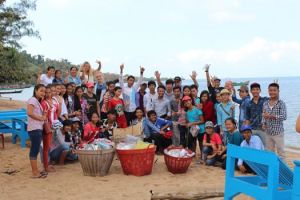


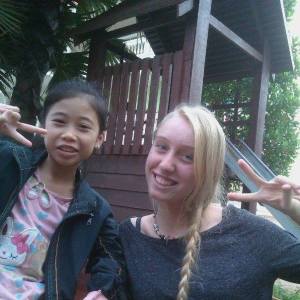

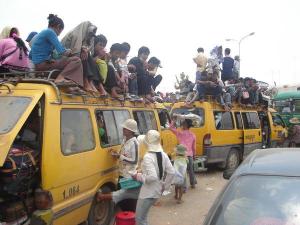
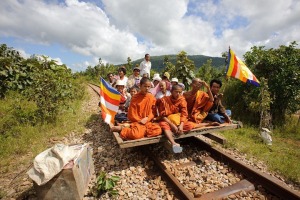
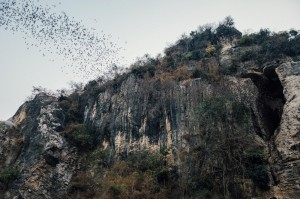
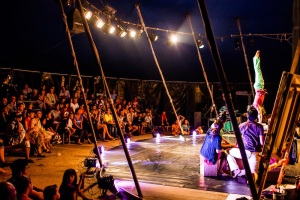


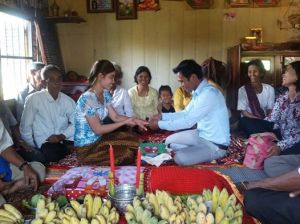
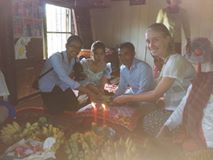

![Norodom Sihanouk [RF: Cambodia RF]](https://captivatingcambodia.files.wordpress.com/2015/02/norodom-sihanouk.jpg?w=289&h=289)
